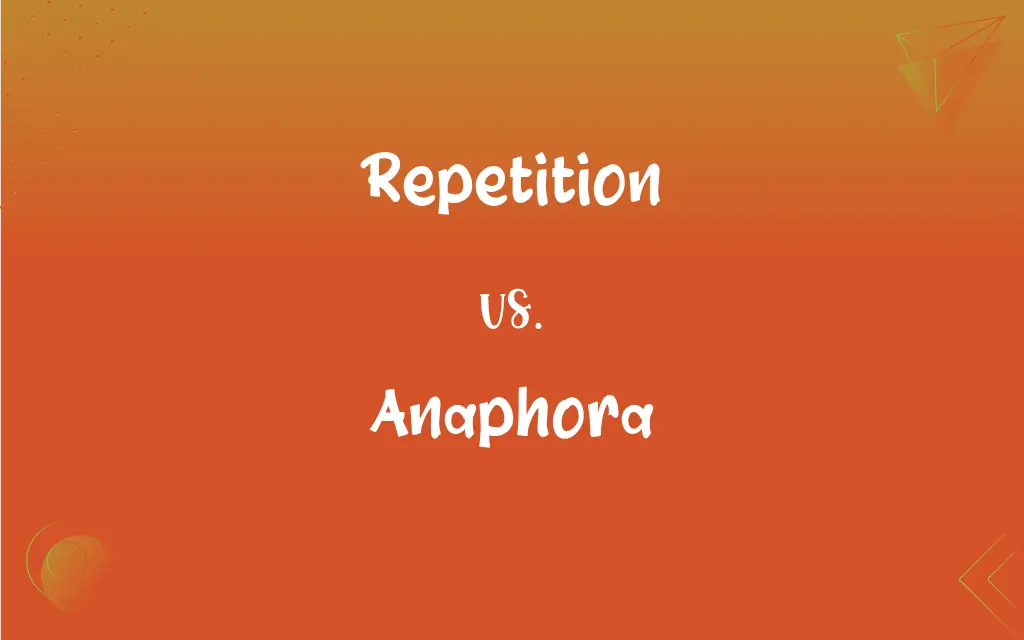Repetition vs. Anaphora: What's the Difference?
Edited by Harlon Moss || By Janet White || Updated on September 21, 2023
"Repetition" is the act of repeating words or phrases, while "Anaphora" is a specific type of repetition where the beginning of successive clauses are repeated.

Key Differences
Repetition in literature and rhetoric involves echoing certain words or phrases to create emphasis or a pattern. Anaphora, on the other hand, is a distinct form of Repetition where successive sentences or lines begin with the same word or phrase, often seen in poetry and speeches.
Repetition serves as a broad term, encompassing any deliberate reuse of words or phrases for effect. Conversely, Anaphora narrows this scope by its unique pattern: the initial repeated sequence in consecutive lines or segments.
While Repetition can occur anywhere within sentences or lines, Anaphora specifically dictates the start. For instance, the repeated use of "love" in a poem could be Repetition, but "Love is..." at the beginning of successive lines would be an Anaphora.
Both Repetition and Anaphora aim to emphasize ideas, create rhythms, and enhance the emotional impact of the text. However, Anaphora often carries a rhythmic or chant-like quality, making it particularly potent in speeches and poetic verses.
In understanding rhetorical devices, Repetition stands as a general technique, with Anaphora as a subset. Not all Repetition is Anaphora, but all Anaphora is a form of Repetition.
ADVERTISEMENT
Comparison Chart
Definition
Repeating words or phrases in a text
Repeating the beginning of successive clauses
Location in Sentence/Line
Can occur anywhere
Specifically at the beginning
Purpose
Emphasis, pattern, or rhythm
Emphasis, rhythm, and often emotional impact
Application
Broadly in any type of text
Commonly in speeches, poetry, and prose
Sub-category
General term
Specific form of repetition
ADVERTISEMENT
Repetition and Anaphora Definitions
Repetition
The act of saying or writing something again.
The Repetition of the chorus made the song catchy.
Anaphora
A poetic technique to create rhythm and evoke emotion.
Not as a call to battle, though embattled we are demonstrates Anaphora.
Repetition
A method to aid memory or understanding.
Through Repetition, she mastered the multiplication table.
Anaphora
The deliberate repetition at the beginning of clauses for emphasis.
Every day, every night, every moment, I think of you employs Anaphora.
Repetition
The consistent pattern in sound, word, or action.
The Repetition in the poem gave it a rhythmic flow.
Anaphora
A form of parallelism in literature to unify ideas.
I have a dream speech by Martin Luther King Jr. is a famous instance of Anaphora.
Repetition
The act or process or an instance of repeating or being repeated.
Anaphora
The deliberate repetition of a word or phrase at the beginning of several successive verses, clauses, or paragraphs; for example, "We shall fight on the beaches, we shall fight on the landing grounds, we shall fight in the fields and in the streets, we shall fight in the hills" (Winston S. Churchill).
Repetition
A recitation or recital, especially of prepared or memorized material.
Anaphora
A rhetorical device where successive lines or sentences start with the same word or phrase.
To be or not to be showcases Anaphora.
Repetition
The act or an instance of repeating or being repeated.
Anaphora
(Linguistics) The use of a linguistic unit, such as a pronoun, to refer to the same person or object as another unit, usually a noun. The use of her to refer to the person named by Anne in the sentence Anne asked Edward to pass her the salt is an example of anaphora.
Repetition
(weightlifting): The act of performing a single, controlled exercise motion. A group of repetitions is a set.
Anaphora
(rhetoric) The repetition of a phrase at the beginning of phrases, sentences, or verses, used for emphasis.
They didn't speak. They didn't stand. They didn't even look up when I came in.
Repetition
To petition again.
Anaphora
(linguistics) An expression that can refer to virtually any referent, the specific referent being defined by context.
Repetition
The act of repeating; a doing or saying again; iteration.
I need not be barren of accusations; he hath faults, with surplus to tire in repetition.
Anaphora
(linguistics) An expression that refers to a preceding expression.
Repetition
Recital from memory; rehearsal.
Anaphora
(Christianity) The most solemn part of the Divine Liturgy or the Mass during which the offerings of bread and wine are consecrated as body and blood of Christ
Repetition
The act of repeating, singing, or playing, the same piece or part a second time; reiteration of a note.
Anaphora
Plural of anaphor
Repetition
Reiteration, or repeating the same word, or the same sense in different words, for the purpose of making a deeper impression on the audience.
Anaphora
A repetition of a word or of words at the beginning of two or more successive clauses.
Repetition
The measurement of an angle by successive observations with a repeating instrument.
Anaphora
The use of a substitute word, such as a pronoun, in reference to a something already mentioned in a discourse; also, the relation between the substitute word and its antecedent. It is contrasted with cataphora, the use of a pronoun for a word or topic not yet mentioned.
Repetition
An event that repeats;
The events today were a repeat of yesterday's
Anaphora
Using a pronoun or other pro-word instead of repeating a word
Repetition
The act of doing or performing again
Anaphora
Repetition of a word or phrase as the beginning of successive clauses
Repetition
The repeated use of the same word or word pattern as a rhetorical device
Anaphora
The initial repetition in religious or formal texts.
In some psalms, Anaphora is used to accentuate devotion.
Repetition
A rhetorical device to emphasize a particular point.
His Repetition of the word freedom underscored its importance.
Repetition
The recurrence of an action or event.
The Repetition of mistakes led to his downfall.
FAQs
Can Repetition occur in the middle of sentences?
Yes, Repetition can appear anywhere in text, while Anaphora is at the beginning.
Does all Repetition have a specific name like Anaphora?
No, but there are specific terms for different patterns, like Epiphora for end repetition.
Can Anaphora span multiple paragraphs?
Yes, as long as successive paragraphs begin with the same word or phrase.
How does Anaphora differ from Epiphora?
Anaphora repeats the start, while Epiphora repeats the end of clauses.
Is Repetition always intentional in literature?
Often, but sometimes it can be coincidental.
Is Repetition more common in poetry or prose?
Both employ Repetition, but it's especially prominent in poetry for rhythmic effects.
Can Repetition be unintentional?
It can, especially in casual speech, but in literature, it's usually deliberate.
Is Anaphora only found in English literature?
No, it's a universal literary device found in many languages.
Is Anaphora a type of Repetition?
Yes, Anaphora is a specific form of Repetition.
Why use Anaphora in speeches?
Anaphora creates rhythm, emphasizes points, and resonates emotionally with listeners.
Why might a writer use Repetition?
To emphasize a point, create rhythm, or evoke emotion.
Is Repetition only about words?
It can also refer to ideas, sounds, or actions reiterated in a text.
Does Anaphora always enhance a text's quality?
It's subjective; well-used Anaphora can, but overuse might seem redundant.
Can one paragraph use both Repetition and Anaphora?
Absolutely! They can coexist to amplify the text's effect.
Why might Anaphora be used in religious texts?
To emphasize devotion, create rhythm, and aid memorization.
About Author
Written by
Janet WhiteJanet White has been an esteemed writer and blogger for Difference Wiki. Holding a Master's degree in Science and Medical Journalism from the prestigious Boston University, she has consistently demonstrated her expertise and passion for her field. When she's not immersed in her work, Janet relishes her time exercising, delving into a good book, and cherishing moments with friends and family.
Edited by
Harlon MossHarlon is a seasoned quality moderator and accomplished content writer for Difference Wiki. An alumnus of the prestigious University of California, he earned his degree in Computer Science. Leveraging his academic background, Harlon brings a meticulous and informed perspective to his work, ensuring content accuracy and excellence.































































